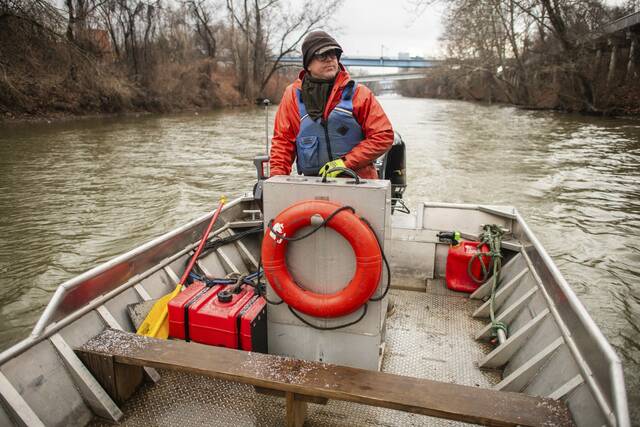Groups are monitoring the region’s waterways and wildlife after a tanker accident on Route 28 spilled 2,000 gallons of diesel fuel.
While authorities are working to mitigate the impact of Tuesday’s accident, which sent large amounts of fuel into Pine Creek and later the Allegheny River, sheens of diesel can still be found throughout the river system.
Members of the Etna Volunteer Fire Department rapidly responded to the single-vehicle crash, which occurred about 5 p.m. In a statement on Facebook, the department said it found the diesel on fire when it arrived and quickly extinguished it before beginning the containment process.
The effort eventually involved more than a dozen local fire, hazmat and law enforcement agencies, but those on-site were unable to keep the diesel out of the larger river system.
According to Evan Clark, captain of local river monitoring and advocacy group Three Rivers Waterkeeper, pools of diesel can be found “pretty much everywhere” downstream from Pine Creek, including the Ohio River.
Viewed from the shore and on a boat, diesel sheens are evident throughout most of the channel next to Herr’s Island in the Allegheny River, and the smell of fuel is prevalent. Diesel scum buildup also is visible near the riverbanks.
Clark said he will continue to monitor the situation, but his organization does not have the capacity for potential cleanup operations, he said. But according to Lauren Camarda, regional communications manager for the Pennsylvania Department of Environmental Protection, the responsible party, Penn Tank Lines, has brought in an environmental cleanup contractor and is working to recover product.
Three oil containment booms were placed in Pine Creek, but these did not entirely halt the flow of diesel into the river system.
According to Camarda, the DEP also is working with the contractor on the feasibility of additional recovery efforts along the Allegheny River.
In his experience, Clark said pollutants in situations such as these tend to be deemed “unrecoverable” and allowed to “naturally attenuate,” meaning the rivers would be left to flush the oil out on their own.
The captain said he expects communities far downstream of Pittsburgh to be affected, likely for at least 100 miles. He said he is worried about the “long-term toxic effects” of the spill and expects the diesel will be visible in the river for weeks to come.
“These things have a tendency to affect everything,” Clark said.
Despite concerns about drinking water contamination, the city of Pittsburgh and bordering communities in the North Hills have confirmed that their water remains uncontaminated.
Millvale and the city draw water from upstream of the spill, and Etna, Shaler and Hampton get their water from underground wells, which have not been affected.
It is unclear, however, how communities further downstream may be affected.
Etna Manager Mary Ellen Ramage confirmed that the DEP remains on-site in Pine Creek.
As for the river’s occupants, Katie Kefalos, director of wildlife rehabilitation at the nonprofit Humane Animal Rescue of Pittsburgh, said oil makes it harder for water fowl such as ducks and geese to regulate their body temperature. With temperatures expected to drop below freezing for most of next week, Kefalos said she is worried.
While she has not seen any animal patients related to the spill yet, Kefalos said it is still early.
“Certainly, I want to stay positive, but it’s too soon to say,” she said.
Other acquatic animals such as beavers, which inhabit rivers and streams throughout the area, also must stay clean to survive, she said.
Kefalos said her organization would begin an extensive washing process with buckets of soapy water on any contaminated animals. In the case of water fowl, she said HARP pays special attention to the birds’ down feathers, which is the primary insulation for the animal.
If residents spot an affected animal, Kefalos said they should call HARP at 412-345-7300, ext. 500, for advice on transporting it for care.

















